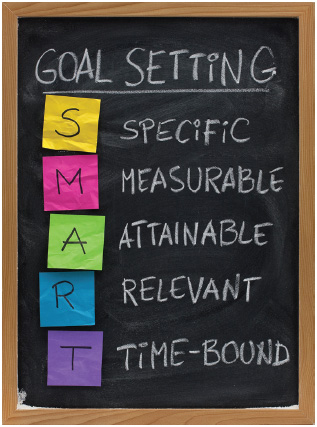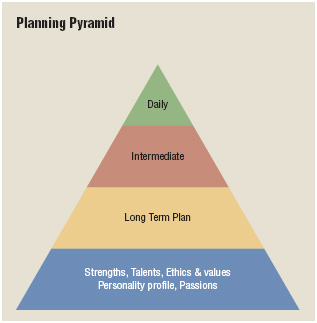What Does It Mean to Get Organized and Set Goals in a Job Search?
In order to carry out an effective and successful search for employment, a job seeker must be organized and set goals. A job search comprises many steps, including discerning what type of job is right for you, networking
, finding job opportunities, applying for jobs, interviewing, following up, and accepting a job offer. When you are looking for a job, organizing your job search will ensure the best use of your time and help you keep track of the many steps, documents, people, and resources involved.
Setting goals for your job search serves several purposes. Applying randomly for many types of jobs in several cities in a random fashion usually does not result in finding the employment you are seeking. By setting goals, you define what type of job you want, where such jobs are located, and what your salary and benefits requirements are. Breaking down your job search goals into smaller subgoals will help you organize your goals into a more concrete action plan. For example, if you set a goal of deciding what type of job you want, you could break this down into more specific subgoals, such as compiling a list of your skills and qualifications, attending one networking event weekly, and approaching three professionals for informational interviews per month.
What Are the First Steps in Setting Goals?
As you begin to organize your job search, you should identify goals for both your career and the job search process. You should begin by assessing your career goals. Consider what you are open to, what you prefer, and what you require in an employment situation. For example, if you and your family own a home in a city and you have small children, you would most likely need your job to be in that city and involve little travel. If you are trained as a librarian, you might decide that you prefer a job in an academic library but would also accept a job in another type of library.
As part of the self-assessment process, you should look at your educational experience, skills gained through previous jobs and extracurricular activities, career goals, interests, and likes and dislikes. Additionally, you should identify strengths and weaknesses in your job skills and interpersonal skills. Compare your experiences and your strengths and weaknesses against the possible job duties and schedules for the types of positions you are seeking. When you are conducting your self-assessment, talk to professionals in your chosen field to learn more about what they do and to determine whether their particular job would be of interest to you. At the same time, staying open-minded about potential work situations will increase your options when you apply for jobs and perhaps result in unexpected insights about your career and potential career changes.

Setting goals that are SMART can help you in your job search. ©ISTOCK.COM/MAREKULIASZ.

Setting your goals as a job seeker can depend on your current employment situation and career stage. If you are a first-time job seeker, you will have to conduct research to be fully informed about your desired job field. At the same time, your job search will likely be limited to entry-level positions. If you are a midcareer job seeker who is currently employed and seeking a new position in your field, you will likely be more aware of the state of your field and its job market. You will also be more likely to begin the job search process with specific goals identified. In both cases, however, self-assessment is key to defining your job search goals.
What Are the First Steps in Organizing a Job Search?

Initially, your job search should focus on creating central documents. You will need to create or update your résumé
and develop basic cover letters
that can be adapted for each job application. You will also need to compile a master list of your skills and qualifications, organize your references, and decide where you will search for jobs and focus your networking efforts. You should also set up a system to keep track of contacts, résumés and cover letters you have submitted, job applications, and any follow-up activities, including thank-you notes or e-mails. If you want to organize your search electronically, a spreadsheet is an ideal tracking tool. If you prefer to work on paper, invest in a set of file folders and a tiered file holder so you can easily access each file.
After you have your central documents organized and prepared, you should decide on a job search schedule that is realistic for the amount of time you have available. The search will feel less overwhelming if you break down each goal into daily, weekly, and monthly subgoals. Each step should consist of specific, concrete tasks. Consider how much time will be devoted each day or week to networking, applying for positions, calling recruiters, and researching jobs and your chosen field. Your schedule can also include events you would like to attend, such as networking events, seminars, trade shows, and job fairs where you can further your job search.
Where Can I Learn about and Find Support in Getting Organized and Setting Goals?
Because the process can be overwhelming, you might need help setting career goals and organizing an effective job search. If you are a first-time job seeker who is about to graduate from college or a recent graduate, your college or university's career center has many resources to help with every step of your job search. Support provided there typically includes seminars, classes, books, online materials, and counselors specially trained to help job seekers find employment.
If you do not have access to a college career center, you can seek help from one of the many federally funded One-Stop Career Centers located around the country. Consult the program's website (http://www.careeronestop.org/
)
to find a center near you and other information. These centers offer free resources such as résumé writing seminars, career counselors, and online advice about job search planning. Some of these resources can also be found at alumni career centers and public libraries and through groups such as professional associations and trade unions. If your budget allows, you might consider hiring a private career counselor who can provide assistance and guidance. No matter what types of support you use to assist in your job search, you will still have to be proactive to organize and complete the search.

Personal job and career goals can range in length from daily to very long term. The foundation of your goals should be in line with your own personal strengths, talents, ethics, values, personality profile, and individual passions. ILLUSTRATION BY LUMINA DATAMATICS LTD. © 2015 CENGAGE LEARNING®. U.S. Department of State. “Planning—Daily, Intermediate, and Long Term.” [online] from http://www.state.gov/m/a/os/64938.htm.
What Role Does Research Play in Getting Organized and Setting Goals?
Research is a key element to setting goals and organizing your job. The more information related to your field or industry you can find, the more focused your job search goals will be. Knowing your target industry, field, and businesses well will also be useful when deciding which jobs to apply for, writing cover letters, and being well prepared for the interview process. Researching potential employers is another key element of an organized job search.

The information you will need during your job search can be found using various sources, including public libraries, career centers, and the Internet. Public libraries and career centers have job-search related books and periodicals, job directories, broad information on trends in various industries, and other background data to help you decide what kind of job you want and how to pursue that job. Public libraries in particular have many industry-specific resources. For example, if you are searching for a job in the horse-trade industry, the public library will be able to help you find equine-related publications, career guides, and the most appropriate horse industry online resources. Public libraries and career centers also offer networking events and job listings.

Numerous online resources offer job search information and support that can help you set goals and organize your job search.
From private job boards to company and government websites, there are many resources from which to draw needed data. For example, the U.S. Department of Labor's Career InfoNet (http://www.careerinfonet.org
) not only features information about jobs by occupation, industry, and state but also includes self-assessments and career tools. The website's Skills Profiler (http://www.careerinfonet.org/skills/
) allows job seekers to list workplace skills and activities and discover matching career options. The site includes information on creating a job search plan as well.
How Should I Approach Getting Organized and Setting Goals in a Job Search?
As you set goals and organize your job search, be sure to maintain an emphasis on personal contact, which can provide you with encouragement and emotional support and may also result in leads for unadvertised jobs. Consult employment support groups and job clubs, especially if you are currently unemployed. Even if you are currently employed, talking about your job search daily with someone can keep the process vital for you. Your subgoals should include networking, informational interviews, and, if possible, finding a mentoring relationship. Networking is important to all organized job searches. It can include all family, friends, appropriate employers and colleagues, and online social networking and business networking websites, such as Facebook (http://www.facebook.com
) and LinkedIn (http://www.linkedin.com
).
What Are the Results of Getting Organized and Setting Goals in a Job Search?
Although there are no guarantees that any job search will result in an ideal position, setting goals and organizing your job search will make the process more productive and focused. The benefits are numerous. Once you have set clear goals regarding your career, you can discern which jobs you should apply for and approach the application process more effectively and confidently. Because you know what kind of job you want and the state of your field or industry, your cover letters and interviews will include specific information and demonstrate your knowledge to potential employers.
Your goal setting and organizational efforts will also be of value when you are rejected by companies to which you apply. You will have a framework in place to continue your search and refine it further. Also, if your job search does not result in job interviews or offers that fit your job or career goals within your ideal time period, the framework and action plan remain valuable. Drawing on the knowledge and resources accumulated over the course of the job search can help you adjust your goals, organization, or, if needed, both.